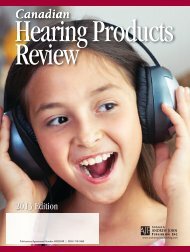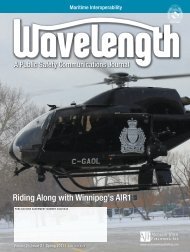Volume 8 Issue 3 (pdf) - Andrew John Publishing Inc
Volume 8 Issue 3 (pdf) - Andrew John Publishing Inc
Volume 8 Issue 3 (pdf) - Andrew John Publishing Inc
Create successful ePaper yourself
Turn your PDF publications into a flip-book with our unique Google optimized e-Paper software.
| seMinars on audition<br />
When the Brain Gets Hard of Hearing:<br />
Paying Attention to Cognition in<br />
Hearing Rehabilitation<br />
By Marilyn Reed, MSc<br />
mreed@baycrest.org<br />
About the Author<br />
Marilyn Reed, MSc, is the practice advisor for audiology at Baycrest, a geriatric care and<br />
research center in Toronto, where she has worked since 1997. Marilyn graduated with a<br />
master’s degree in audiology from the University of Southampton in England in 1976, and has<br />
since worked in clinical audiology in a variety of settings, always with a geriatric interest.<br />
Alzheimer’s disease, the most<br />
common form of dementia, has<br />
become the primary public health<br />
concern in Canada. It is the leading cause<br />
of disability among Canadians over the<br />
age of 65, already costs billions of dollars<br />
each year, and prevalence is predicted to<br />
double worldwide within 20 years. 1<br />
Dementia cannot be prevented or cured,<br />
and there is an urgent need to find ways<br />
to delay the onset and progression of the<br />
disease and reduce the associated social<br />
and economic costs.<br />
Since hearing loss and cognitive<br />
impairment are both highly prevalent in<br />
older adults, dual impairments are<br />
common. However, hearing loss is more<br />
prevalent in those with dementia than in<br />
matched control. 2 The link between agerelated<br />
hearing loss and cognitive<br />
impairment has been well-established<br />
through over 30 years of research, but<br />
recent epidemiological findings show<br />
that older adults with hearing loss are<br />
more likely to develop dementia, and the<br />
more severe the hearing loss, the greater<br />
the risk. 3 Longitudinal studies have also<br />
shown a close correlation between<br />
central auditory processing (CAP)<br />
problems and cognitive impairment,<br />
with scores on dichotic speech tests being<br />
predictive of the likelihood of cognitive<br />
decline. 4,5<br />
The specific mechanisms underlying the<br />
association between audition and<br />
cognition are unknown; theories include<br />
the possibility of a common cause, due<br />
to age-related pathological changes in the<br />
brain, or a causal relationship, with<br />
hearing loss being a modifiable risk factor<br />
for cognitive decline. Possible causal<br />
pathways might involve the additional<br />
burden that hearing loss places on<br />
declining cognitive resources needed for<br />
information processing, or the lack of<br />
cognitively stimulating interaction and<br />
social isolation resulting from sensory<br />
deprivation.<br />
Whatever the mechanism, the evidence<br />
strongly suggests that hearing loss may<br />
contribute to or accelerate the<br />
progression of symptoms of cognitive<br />
decline in older adults. If management of<br />
hearing loss could reduce or delay the<br />
progression of dementia, the implications<br />
for the cognitive health of older adults<br />
and the costs of dementia to public<br />
health and society as a whole are huge.<br />
Audiologists need to be aware of the<br />
role that cognition plays in the<br />
communication problems of our clients<br />
so that we can begin to apply recent<br />
research findings to improve both<br />
assessment and management. While it<br />
may be obvious which clients have more<br />
advanced dementia, milder cognitive<br />
impairment is difficult to recognize in<br />
only one or two visits, and yet can have a<br />
significant impact on the success of our<br />
interventions. A “snapshot” of the<br />
cognitive status of randomly selected<br />
Baycrest audiology patients over the age<br />
42 CANADIAN HEARING REPORT | REVUE CANADIENNE D’AUDITION






